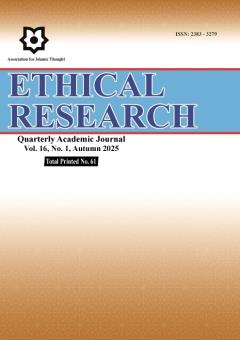An explanation of the social problems arising from the shortcomings of the arbitration law in divorce
Subject Areas : Ethics and Islamic Education
1 -
Keywords: arbitrator, divorce, dispossession and divorce, rift, reformation of zat al-bin, consensual divorce.,
Abstract :
In case of signs of disagreement between couples, it is necessary for the government to establish a family peace institution to resolve the dispute and create peace between the couples, and this institution is referred to as arbitration in Iranian law. Divorce arbitration in Iran, as one of the important tools for resolving couples' disputes, plays a vital role in reducing the burden of the courts and facilitating the divorce process. However, the arbitration process faces many challenges at the legal and ethical levels, which can have a negative effect on the fairness and efficiency of this method. Therefore, the present study was conducted with the aim of examining the disorders and shortcomings in the divorce arbitration system from two legal and ethical dimensions and providing effective solutions to improve the situation. Legal defects in Iranian law in the matter of divorce arbitration, ethical challenges of arbitration between divorce parties have been discussed. Based on the findings of this study, it is suggested that the judiciary, in addition to the family courts, form the necessary number of arbitration branches composed of legal experts, family counselors and psychologists to help the court to resolve family disputes. In addition to training and empowering arbitrators, implementing stronger monitoring mechanisms, creating transparency in the arbitration process are other suggestions of this research to reduce the legal and ethical challenges of divorce in Iran.
طبرسي، ابن علي الفضل بن الحسن (1995م)، مجمع البيان في تفسير القرآن، چ2، بيروت: مؤسسة الأعلمي للمطبوعات، ج3، ص80.
هدايت¬نيا، فرج الله، (1386)، فلسفة حقوق خانواده، چ1، تهران: روابط عمومي شوراي فرهنگي ـ اجتماعي زنان، ج3، ص233.
نجفي، محمد-حسن (1994م)، جواهر الکلام في شرايع الاسلام، چ2، بيروت: نشر دار احياء تراث العربي، ج31، ص209.
مکارم شيرازي، ناصر و همکاران (1375)، تفسير نمونه، چ3، تهران: دارالکتب الاسلاميه، ج3، ص240.
قرائتي، محسن (1382)، تفسير نور، چ5، تهران: مرکز فرهنگي درسهايي از قرآن، ج2، ص285.
طباطبايي، سيد محمدحسين (1372)، الميزان في تفسير القرآن، چ3، قم: دارالکتب¬الاسلاميه ج3، ص247.
مکارم شيرازي، ناصر و همکاران (1375)، تفسير نمونه، چ3، تهران: دارالکتب الاسلاميه، ج3، ص375.
طبرسي، ابن علي الفضل بن الحسن (1995م)، مجمع البيان في تفسير القرآن، چ2، بيروت: مؤسسة الأعلمي للمطبوعات، ج3، ص81
.ناجي، محسن (1970م)، شرح قانون احوال¬الشخصيه، چ1، بغداد: نشر الرابطه، صص 321ـ 320.
هدايت¬نيا، فرج الله، (1386)، فلسفة حقوق خانواده، چ1، تهران: روابط عمومي شوراي فرهنگي ـ اجتماعي زنان، ج3ص237.
مکارم شيرازي، ناصر و همکاران (1375)، تفسير نمونه، چ3، تهران: دارالکتب الاسلاميه، ج3، ص376.
.عيسي الفقي، عمرو (2005م)، الموسوعه الشامله في احوال الشخصيه، چ1، قاهره: دارالکتب القانونيه، ص113.
استانبولي، اديب (1997م)، الصيغ القانونيه لدعاوي الأحوال¬الشخصيه، چ2، دمشق: نشر المکتبه القانونيه،ص494.


